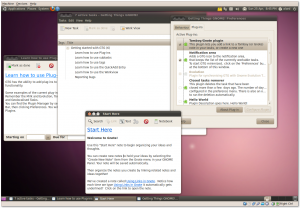How to remove Mono from Ubuntu 10.04 Lucid Lynx [Updated]
To remove Mono from your shiny new desktop installation of Ubuntu 10.04 Lucid Lynx enter the following command (after taking the usual precautions like backups of your data etc):
sudo apt-get purge libmono* libgdiplus cli-common libglitz-glx1 libglitz1
[UPDATE: Many thanks to Directhex who pointed out my error regarding the need to remove libsqlite0. I’ve removed it from the command above. He also requested (you can see in his comment below), that I mention that the mononono package is no longer particularly effective at preventing Mono from being installed. Thanks for the prompt Jo, I was going to but I just forgot.]
This is almost the same one as used for the Karmic Koala release (9.10), and for me the result of the above command was as follows:
The following packages will be REMOVED
cli-common* f-spot* gbrainy* libart2.0-cil* libflickrnet2.2-cil* libgconf2.0-cil* libgdiplus* libglade2.0-cil* libglib2.0-cil* libglitz-glx1* libglitz1* libgmime2.4-cil* libgnome-keyring1.0-cil* libgnome-vfs2.0-cil*
libgnome2.24-cil* libgnomepanel2.24-cil* libgtk2.0-cil* liblaunchpad-integration1.0-cil* libmono-addins-gui0.2-cil* libmono-addins0.2-cil* libmono-cairo2.0-cil* libmono-corlib2.0-cil* libmono-data-tds2.0-cil* libmono-i18n-west2.0-cil* libmono-posix2.0-cil* libmono-security2.0-cil* libmono-sharpzip2.84-cil* libmono-sqlite2.0-cil* libmono-system-data2.0-cil* libmono-system-runtime2.0-cil* libmono-system-web2.0-cil* libmono-system2.0-cil* libmono2.0-cil* libndesk-dbus-glib1.0-cil* libndesk-dbus1.0-cil* libnunit2.4-cil* mono-2.0-gac* mono-gac* mono-runtime* tomboy*
0 upgraded, 0 newly installed, 40 to remove and 0 not upgraded.
After this operation, 49.8MB disk space will be freed.
Do you want to continue [Y/n]?
I chose to accept this and proceeded. Of course YMMV so please check carefully before hitting that enter key. The purge switch of this command removes any configuration files as well as the packages themselves.
Compared to Ubuntu 9.10, in 10.04 there appears to be just one new Mono dependant application called gbrainy (in the Games menu) which is described thus: “a platform to train memory, arithmetical and logical capabilities with many sorts of different exercises of different difficulty levels”.
Unfortunately it appears as though the “training” objective of gbrainy might not be realised…
Over the last year or so, the BBC have carried out an experiment which examined “brain trainer” games. Subsequent analysis of the data found that these brain trainers are an empty promise as reported here in The Guardian:
Practising brain-training games will improve your performance on brain-training games, but that effect will not transfer to other aspects of brain function. They will not make you brainier, so you may as well just pootle around on the internet.
It seems that not much grey matter will be lost by removing the gbrainy package then 😉
The other applications expunged by removing Mono from the default Desktop installation are the same as last year: F-Spot and Tomboy.For a very similar alternative to Tomboy try Gnote, and as I like task-related management too I also recommend the excellent GTG [Getting Things Gnome] application. To install these two simply type: sudo apt-get install gnote gtg.
The alternative for F-Spot I usually use is a combination of gthumb and Gimp, the latter of which has been removed from the default Lucid desktop install to make space for other things. Both of these applications can be easily installed by a simple sudo apt-get install gthumb gimp command. However there is now a new kid on the block which looks quite exciting called shotwell. Shotwell will be the default camera/image app in the forthcoming Fedora 13 distribution replacing gthumb (as it has no dependencies on Mono in the default desktop installation). It is also, I was pleased to discover, available in the main Lucid repository so can be installed using either the command line: sudo apt-get install shotwell or you can use the very easy and graphically attractive Ubuntu Software Centre (as you can for the other applications listed above also). This is how Fedora describe Shotwell in the preliminary release notes:
Shotwell is an open source photo organizer designed for the GNOME desktop environment and has replaced Gthumb by default in Fedora 13. It supports the following features:
- import photos from any digital camera supported by gPhoto
- automatically organize events containing photos taken at the same time
- use tags to organize your photo collection
- edit non-destructively when altering photos, without ruining originals or using disk space for each copy
- publish photos to Facebook, Flickr or Picasa
- one-click auto-enhancement
- rotate, mirror, and crop photos
- reduce red-eye and adjust the exposure, saturation, tint, and temperature of your photos
- edit any photo, even if it’s not imported to the Shotwell library
I haven’t used Shotwell yet but it sounds like a good one to try out.
There you have it and hopefully that will be it for another 6 months on this subject.
Planet Saving Software for Linux now released!
Regular readers of this blog will know that I’ve been keen to try and help the folks at Miserware to get their Linux energy saving software (it’s also available for Windows for those who haven’t seen the light yet) tested on lots of PCs.This morning I had an email telling me they’ve completed their testing and have now hit final release. They’ve also changed the name of the software from Micromiser to Granola:
Happy Earth Day!
The MiserWare team is proud to announce that MicroMiser Beta is out of beta and now called Granola! Why the name change? We feel like the name Granola more accurately captures our goal of making a serious impact on the planet through the reduction of wasted energy. Along with the name change, we are also rolling out a new website that allows us to increase awareness and attract new users to Granola. Check out the new site at http://grano.la/
There are over a billion personal computers in the world. Together, they consume hundreds of billions of kilowatt hours annually. If each of these computers ran Granola and reduced their power consumption by even 10%, it would be like taking 7 million cars off the road. Or planting 900 million trees. Or turning off 65 coal power plants.
The first step to protecting the Earth starts with individuals decreasing their own environmental impact and encouraging those close to them to do the same. Running Granola yourself is a great first step, but really making an impact requires the users of Granola to encourage their friends and family to also use the software. For every new computer that runs Granola, we are one step closer to the vision of Granola on every system worldwide.
For Linux PCs:
If you’re already running MicroMiser Beta and using the MiserWare Software Repository, Granola will automatically replace MicroMiser Beta the next time you check for your software updates. Otherwise, please visit the Granola download page at http://grano.la/help/ This release of Granola also includes support for Ubuntu 10.04 Lucid Lynx. Also, due to popular demand we have created a GUI for Linux, supported on FC11+ and Ubuntu 9.04+! Find instructions and information about the new GUI at http://grano.la/help/install.php#gui
For Windows PCs:
Granola for Microsoft Windows includes automatic updates to keep Granola on your PC up to date with the latest version. If you are already running MicroMiser Beta, there is no need to uninstall. Simply download the installer from http://grano.la/help/ and Granola will replace MicroMiser Beta.
Regards,
The MiserWare Team
—
Change Log* Added Windows automatic updates.
* Added a Linux GUI.
* Improved Windows installer.
* Re-branded MicroMiser as Granola.
* Remove Debian 4.0 Etch and add Ubuntu 10.04 Lucid.
* Added CumulateReportFile option to granola.conf.
* Re-factored the Windows GUI to centralize all of the style data (colours and fonts so far).
* Added persistent reporting to MicroMiser.
* Added failure resilience to the update downloading code.
* Updated the Python for the updater. Added code in MicroMiser Application to gracefully handle update failures.
* Updated get_updates to check for an MSI and download updated versions if available.
* Fixed a bug where we do not chown or chmod the var lib MiserWare directory and can be left not being able to write to our own directory.
As they say, even if the energy savings on individual computers are relatively small, the cumulative effect across millions of machines will be significant. I’ve had this software running on many different machines around our home and on laptops & netbooks with no noticeable impact on performance. Please try it out and tell your friends and family.
I updated my Ubuntu Karmic desktop install this morning and noticed one small problem with the instructions on their website. For me I had to explicitly install the gui with sudo apt-get install granola-gui. I’ve emailed them about it.
The software is free for personal use, but I should point out that most of it is not Free (as in Open Source). There are some interesting words on their Wiki page about what is free and what isn’t and what they (Miserware) are all about:
Why are you giving Granola away for free?
We care about the environment and we are proud of the ability of our software to make computers more energy efficient. We also like when our laptops last longer and our servers cost less to operate. We want everyone to be able to use our software on their personal machines. So, early on we decided that in addition to creating enterprise power management software, we would also create a commercial-grade consumer version, Granola. Granola is free for your personal use and we have no intention of charging for it anytime soon.We also need to create a thriving business so we can make computers even more energy efficient (trust us, we’ve got lots of other cool stuff on the drawing board). We are a small startup working out of a basement, and we provide Granola for free with the intent of helping to clean up the world. If you would like to donate to help us continue to provide Granola for free, we would welcome the funds. If you work for a company that you think would benefit from MiserWare software, we would love for you to refer them to us.
I think it is important that this kind of product is encouraged. In my opinion every little bit we can do to reduce our energy consumption is a Good Thing…
Update on UK Gov’s Institutional Profligacy
As you may recall, a couple of weeks ago I used Write to Them to contact my MP, Jeremy Hunt, regarding the comments of the new CIO of HMRC and how it seemed that saving money was not being encouraged by our civil servants. I discussed it in this blog post:
Phil Pavitt, recently-appointed CIO for HM Revenue and Customs, has revealed that attempts to cut government budget is positively discouraged. In a telling anecdote, he says “In my first few weeks of the job I was visited by leading members of the Cabinet Office. In that conversation with me they mentioned I am in the top purchasing club… That means you have tremendous influence on buying power, buying ideas and management and so on.â€I said ‘If I reduce costs by 50 per cent what happens?’, ‘Well, you leave the club,’ I was told.â€
A couple of days ago I got a follow up from Jeremy after he received a reply from the Rt. Hon Angela Smith MP, Minister of State at the Cabinet Office. He didn’t seem that impressed…
Dear Alan,
Further to my email of 16th February 2010, I have now received the attached response from the Rt Hon Angela Smith MP, Minister of State at the Cabinet Office.
Given the worrying content of your email, the Minister has responded with little more than a standard response about how they always try to obtain good value for money.
Sadly we will never know what was said amongst the Minister and her civil servants about your email. However, I think we can be confident that it bore no resemblance to the final response I received!
Whilst Ms Smith’s comments are not surprise, I am sorry to have to pass on such a disappointing reply. If there is anything further I can take up with the Minister in the future on this issue, please feel free to let me know.
Best wishes
Jeremy
Jeremy Hunt
Member of Parliament
South West Surrey
I’ve attached the reply* so everyone can read it. Here is page 1, and here is page 2.
As you will see, the response is just a stock reply and gives almost no comment whatsoever to the main thrust of the question.
* The Minister’s response was emailed to me as a scanned PDF and it contained my home address and her email and phone numbers. I imported it into Inkscape and obfuscated those details which ended up creating 2 separate files.
OT: Quick update on the Chillies
It’s just over 5 weeks since my Chilli seeds were removed from their packets and started off in the airing cupboard.
A few people have kindly enquired about their current status. Here’s a few pictures…
There haven’t been any major dramas and although the rather dull light we had through February hasn’t been ideal the plants seem to be doing fine. Our greenhouse is now clean and I noticed recently the automatic windows starting to lift after some prolonged sun so shortly they will start getting taken out during sunny days, but returned when it gets cold.
The next update will probably after potting-on.
Open Source, UK Gov. & Institutional Profligacy
I got a tad annoyed after reading this article by an old journalist friend and colleague Maxwell Cooter. In the story the new CIO of HMRC is reported as saying that there is basically institutional profligacy within the Cabinet Office:
Phil Pavitt, recently-appointed CIO for HM Revenue and Customs, has revealed that attempts to cut government budget is positively discouraged. In a telling anecdote, he says “In my first few weeks of the job I was visited by leading members of the Cabinet Office. In that conversation with me they mentioned I am in the top purchasing club… That means you have tremendous influence on buying power, buying ideas and management and so on.”I said ‘If I reduce costs by 50 per cent what happens?’, ‘Well, you leave the club,’ I was told.”
As you will probably know, I have a vested interest in seeing the Cabinet Office’s Open Source, Open Standards and Re-Use Action Plan[pdf] implemented in full and as quickly as possible. The comment above however, coming from deep within the halls of power, is a clear indication that there seems to be little appetite to drive this Action Plan into, ahem, action. I used the excellent Write to Them service to write to my MP Jeremy Hunt…
Dear Jeremy Hunt,
I run an independent consulting company specialising in an area of software technology called Open Source.
We help organisations of all sizes get best-value by using technologies that are developed for the benefit of the user rather than of the producer.
We have been following the Cabinet Office’s recent Action Plan called “Open Source, Open Standards Re-Use” with some interest and have commented positively on the quality of the document but found there to be little in the way of energy to implement or monitor it’s adoption.
Today, I read an article by a journalist whom I have known for many years which seems to corroborate our opinion that there is little motivation for the status quo to change.
The link to the article is here:
http://blogs.techworld.com/the-blue-screen/2010/02/letting-the-cat-out-of-the-bag/index.htm
“Phil Pavitt, recently-appointed CIO for HM Revenue and Customs, has revealed that attempts to cut government budget is positively discouraged. In a telling anecdote, he says “In my first few weeks ofthe job I was visited by leading members of the Cabinet Office. In that conversation with me they mentioned I am in the top purchasing club… That means you have tremendous influence on buying power, buying ideas and management and so on.”I said ‘If I reduce costs by 50 per cent what happens?’, ‘Well, you leave the club,’ I was told.”
As I understand it, these are civil servants and as such are non-political.
Could you please comment on how a Conservative Government would try to change this apparently appalling attitude towards public expenditure.
Yours sincerely,
Alan Lord
—
The Open Learning Centre
Web: www.theopenlearningcentre.com
A couple of days ago I got an initial reply and, although the response itself isn’t exactly exuberant, Jeremy does indicate one thing I have heard something about before; the Tories policy of splitting massive IT projects into much smaller component parts by using Open Standards. This shows to me they have a decent understanding of the power of Open Standards to break the stranglehold a few monopolies currently have, although of course the proof will be in the delivery… He has also written to the Minister of State at the Cabinet Office to get the Government’s response to my enquiry too.
Here’s his reply in full.
Dear Alan,
Thank you for your email in which you kindly included your own experiences of the Cabinet Offices Action Plan called “Open Source, Open Standards Re-Use”.
Whilst I was pleased to hear you are complimentary about the quality of the document, I was sorry to learn that there seems little in the way of follow-up.
I was also most concerned to read the contents of the article by Maxwell Cooter.
Having spoken to the appropriate Shadow Cabinet Member as you requested, they have assured me that the Conservatives will create a level playing field for open source software by introducing open standards across government that enable large ICT projects to be split into smaller modular components. This will cut licensing costs, reduce risk and enable more small companies to bid for government ICT contracts.
I hope this is helpful and in order to get the Government’s response to the issues you have raised, I have also written to the Rt Hon Angela Smith MP, Minister of State at the Cabinet Office seeking her comments.
As soon as I have received the Minister’s reply, I will of course let you know straight away.
Thank you once again for bringing this important matter to my attention and if I can be of any further assistance in the meantime, please do let me know.
Best wishes
Jeremy
Jeremy Hunt
Member of Parliament
South West Surrey
If you want your MP (or future MP), whatever party they represent, to at least be aware of issues that concern you, please write to them. It is an easy way to voice your opinion. I have found MPs and MEPs to be generally quick to reply, to have understood the points I made and to follow up on issues when they said they would.
PS: Once I have the Minister’s reply I will of course let you know straight away too.
PPS: Can I please be recorded as the first to come up with the phrase “Institutional Profligacy” 🙂
Sam Varghese Got It Wrong?
On the 10th of February I updated my original “Is Canonical becoming the new Microsoft?” post to make it clearer that what I was actually asking was about whether the company is becoming the next organisation that we love to hate because of the increasing level of criticism aimed at it and it’s flagship product Ubuntu.
Today, the 15th February, Sam Varghese has written about a conversation iTWire have had with Mark Shuttleworth regarding my original post. Unfortunately not only does he seem to have missed the point of that original post, but he also writes as though I was making an accusation or statement rather than asking a question:
“He was responding to queries from iTWire about a recent blog post that has claimed Canonical is becoming the new Microsoft.”
He goes on to list some of the points I made:
The blog post had listed a number of reasons why the writer thought Ubuntu was allegedly becoming the new Microsoft: the inclusion of Mono as a default; the creation of Ubuntu One, a proprietary software repository; removing the GIMP and other applications from Ubuntu; changing the default search engine to Yahoo!; discussion about what proprietary applications should be included in the Ubuntu repositories; and the appointment of Matt Asay as chief operating officer.
Please, let’s get this straight. I have noteworthy opinions on one or two of the points I mentioned, but that was not the point of the post. They were supposed to be taken as examples of a collection of decisions that are apparently, in various quarters, providing the fuel for an increase of criticism overall.
Personally I really am not bothered about the Gimp being removed (it is easy to install), nor OpenOffice.org from the UNR (I actually install the desktop edition on my netbook anyway), nor am I upset about Ubuntu One; it’s an interesting solution, I use it sometimes myself and I’m sure a Windows version will be most welcome by many around the globe. Neither am I bothered about the Yahoo search thing (If Canonical can get money from Microsoft then that’s just funny IMHO), and I was actually pleased about Matt Asay’s appointment; he will bring a wealth of commercial experience, a good dose of much needed sales & marketing skills to the operation and I’m sure much more besides.
Sam also didn’t mention any of this from my original post:
I really like Ubuntu. I use it everywhere, I help in the Ubuntu-uk irc channel when I can and we [our company] promote Ubuntu to our customers and I [as an individual] to friends and family.
What concerns me is not any particular item in the list above: some I care about, others I do not; as I am sure many of you will do too. It is the increasing volume of criticism and vitriol as a whole. It is getting louder. This, I believe, is indicative of a turning tide that, if we are not careful, will result in Ubuntu losing popularity and more of the FOSS community exercising it’s freedom.
I did not claim Canonical was becoming the new Microsoft. I asked if it might be. I also (admittedly not very clearly on my first pass) was interested in the reasons why Canonical/Ubuntu is getting more criticism directed at it at a time when it is becoming more successful and more important and was hoping to solicit some ideas and opinion as to how we could stop that increasing criticism and prevent what seems to be a fairly common occurrence with big and successful companies; we are even seeing it with Google now. Ubuntu/Canonical is built on very different principles to traditional commercial enterprises, so could we, as the community, come up with any ideas to prevent the “love-to-hate” syndrome?
I don’t read iTWire much. I only noticed this post from Sam as I had a couple of referred clicks to this blog today and was interested in where they were coming from.
Sam, your article paints me with a brush which I do not believe to be fair or accurate.







